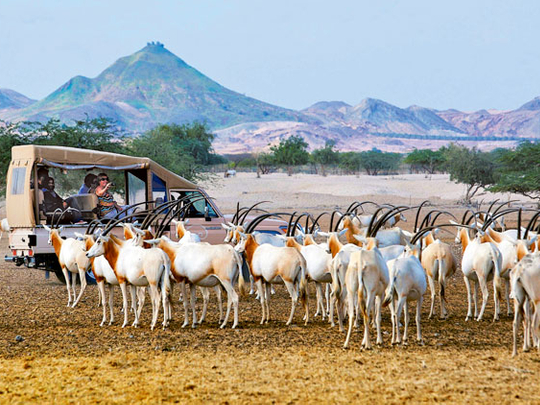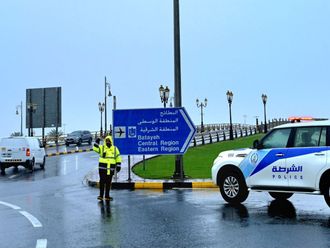
A safari in the desert? Until last month, I’d shudder at the thought, having had
my fill of mediocre dune bashing experiences and dancers with more belly than rhythm. But thanks to a new flight connection, a much nicer experience is now closer than ever.
Although we were forced to set off unreasonably early at 6.30am, we were rewarded almost instantaneously, with the sighting of a herd of sand gazelle roaming the desert. A few kilometres away we spot black bucks, ostriches and magnificent Arabian oryx. Over the next hour we encounter some 20 of the 200-plus bird and animal species at Sir Bani Yas Island in Abu Dhabi. The cheetahs are shy this morning and the giraffes, it seems, don’t want to be found. But as I head back to bed at the time I’d normally be starting my working day, every one in our party is smiling broadly, delighted at being able to encounter another side of the UAE.
It’s this sort of experience, two and a half hours away from Dubai’s concrete sprawl, that David Garner hopes will push summer occupancies up at the island’s only hotel, the Desert Island Resort by Anantara. The Thai hotel chain has teamed with executive carrier Rotana Jet to offer two nights’ stay at the property, inclusive of flights from Abu Dhabi’s Al Bateen airport, at Dh1,100 per night until the end of the summer. Other packages at the resort bundle activities into the cost of a room night.
“We offer up to six packages per property that Anantara manages in the UAE. These include a selection or combination of spa, activities and meal-led components. In the city this can include golf packages, a city tour, kayaking through the mangroves, and spa treatments,” says Garner, who is Anantara’s Regional Director of Sales and Marketing for the Middle East. The group’s new Eastern Mangroves property, which opened last month in Abu Dhabi city, has rooms on offer for a limited period at Dh1,200 per night, with the same amount returned for use on food, beverages and spa. Over the summer, Garner expects occupancy to touch 50 per cent at his resort properties, the Desert Island Resort and the Qasr Al Sarab Desert Resort in the Empty Quarter.
Attractive room rates
For the cash-strapped and time poor a summer holiday in the UAE is always an attractive option. To bolster occupancy levels in a leaner business period, hotels have rolled out almost unbelievably attractive room rates with shopping vouchers or family activities thrown in.
The newly rebranded Mercure Gold Hotel Al Mina Road Dubai’s Golden Summer Package is primarily for the GCC market, with rates from Dh295 per night, according to Deepak Dahiya, Director of Sales and Marketing at the hotel. Sharjah’s Coral Beach Resort offers a third night for $1 (Dh3.67) when staying two nights at Dh699, while Fujairah’s, Radisson Blu Resort has a pay-for-two-and-stay-for-three deal from Dh499 per night.
Some of the push comes from the emirates’ governments, which aim to position the UAE as the ultimate Middle Eastern getaway over the summer. The Summer in Abu Dhabi promotion, for instance, sees hotels in the capital offer GCC residents their second room on a complimentary basis along with vouchers for Abu Dhabi-based events.
Add to that factors such as the Arab Spring – the impact of which saw Dubai post double-digit growth in RevPAR or revenue per available room in the first quarter of 2012, as reported by the Arabian Hotel Investment Conference in April. The industry remains upbeat about the months ahead.
Holding promise
Stewart Coggans is Executive Vice President – Middle East and Africa at Jones Lang LaSalle Hotels, the hotel advisory company. He believes UAE hotels will post summer results not seen since the property crash in 2008. “In pure occupancy and average daily room rate, this summer’s hotel performance will be better than the last three years. This is driven partially by displaced demand from Middle Eastern markets impacted by the Arab Spring, coupled with perceived economic improvements in the key source markets of Europe and Asia. Also, there is an increase in GCC leisure business particularly in Dubai, though it does have a similar influence in Ras al Khaimah and Fujairah.”
Marc Descrozaille, Regional Director UAE, Egypt and Jordan at Carlson Rezidor Hotel Group, agrees. “We expect our resort- and leisure-oriented hotels to have occupancy between 70 and 90 per cent, and business-oriented hotels, between 50 to 60 per cent,” he says of his expectations over summer.
Sadiq Iqbal, Regional Director, Sales and Revenue Management at Hospitality Management Holdings (HMH), the parent company for Coral Hotels and Resorts, Corp Executive Hotels, EWA Hotel Apartments and Ecos Hotels, is even more upbeat. “So far our hotels have put up an impressive performance with a strong occupancy in the UAE averaging at 85 per cent and we expect the trend to continue,” he says.
Coggans, however, sounds a note of caution. “In the last three years Abu Dhabi and Dubai markets declined by about $50-60 in RevPAR over the summer months in comparison with annual figures. It is likely that this pattern will be similar this year,” he says. For HMH’s Iqbal, at least, that isn’t the case. “RevPAR has grown by 14.7 per cent at our hotels compared to last year,” he adds.
A few players, including Carlson Rezidor’s Descrozaille, believe the holy month of Ramadan will impact revenues, but savvy operators see an opportunity there, too.
“GCC travellers tend to come to Dubai during the second half of Ramadan, which then leads into the Eid Al Fitr holidays, so it makes strategic sense for us to focus on this market as well,” says the Mercure’s Dahiya.
Turns out, the UAE might also be just the place to plan your holiday over Eid.












